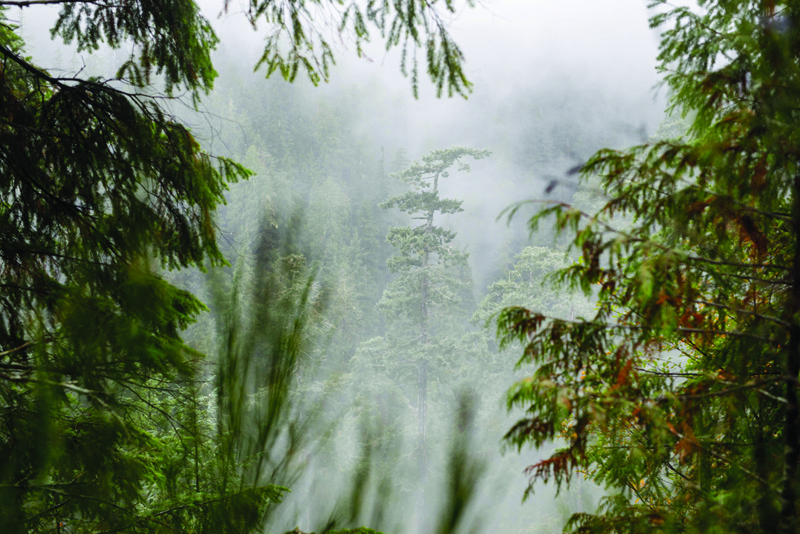 PORT RENFREW: Swaths of trees are seen from a lookout on the logging road that leads to a series of protest camps for the Fairy Creek anti-old growth logging blockade, 18kms northeast of Port Renfrew on Vancouver Island. - AFP
PORT RENFREW: Swaths of trees are seen from a lookout on the logging road that leads to a series of protest camps for the Fairy Creek anti-old growth logging blockade, 18kms northeast of Port Renfrew on Vancouver Island. - AFP
PORT RENFREW, Canada: Guarding road blockades, digging trenches, and sleeping under the leafy canopy - for the past year, protesters on Vancouver Island have battled to halt logging in one of Canada's last ancient cedar and fir forests. Working in relays to ensure activists are present at all times, they've faced off against police armed with court injunctions and sometimes heavy-handed tactics.
More than 1,000 arrests have been made so far. But the ragtag group's efforts to protect the 1,200 hectares (2,470 acres) of old-growth trees - some approaching 2,000 years old, with huge trunks and whose tops disappear in thick mist hanging above -- have been met with mixed reactions from the indigenous Pacheedaht First Nation tribe who claim the land on this island off Canada's Pacific coast.
At an entry point to Fairy Creek area, northeast of the city of Port Renfrew, British Columbia, activists set up on a gravel road to deny the Teal-Jones Group logging company access to the trees, which protesters say are important tools for controlling carbon levels in the air. "If the trees are cut down, the future is gone," says a protester who's been camped here for six weeks and goes by the name Rayvn.
She and other protesters keep watch at the blockade around the clock. Police move in to pull a protestor from a trench. Under pouring rain, protesters start clapping their hands in unison, led by the banging of a tambourine. Another protester, named as Sweet Skunk, 43, has been here for two months. He says he is alarmed at the loss of flora and fauna, even though British Columbia deferred logging of Fairy Creek by two years last June. Fairy Creek is home to several endangered species of birds, such as the marbled murrelet, which is only found along the western coast of northern North America.
Protest divides indigenous tribe
Canada's westernmost British Columbia province has the largest forestry sector in the nation, employing more than 50,000 people as one of the world's largest exporters of wood products - old-growth trees are used in products such as furniture and musical instruments. The forest sector was responsible for about $11.5 billion of British Columbia's total exports in 2020. The province estimates that about 20 percent of its vast forests - or about 11.1 million hectares - are old-growth, meaning that on the coast they are filled with towering trees at least 250 years old.
But, according to an April 2020 independent report, only a "tiny proportion" of these forests still support such ancient trees after decades of harvesting. In their fight, the Fairy Creek protesters claim to also be defending indigenous land rights, as the watershed is on Pacheedaht First Nation territory. Rayvn, 27, her dreadlocks tucked beneath a bonnet, says she supports "indigenous people deciding what happens to this land." She says she quit her addiction counselor job to join the protest because "this is way more important."
Another protester who introduces himself as Maikan says he hopes he is "rebuilding trust with indigenous peoples." The forty-something construction worker tells AFP: "I won't stop until there's a law protecting British Columbia's ancient forests." But in reality, the protest has split opinions in the Pacheedaht First Nation. Some members support the protesters, but the tribal leadership - which has committed to sustainable logging - has asked them to leave "and let our Nation get on with the business of deciding how best to manage our hahahuuli (traditional territories) in peace."
'Iconic old-growth forests'
Since August 2020, police have arrested over 1,150 protesters at Fairy Creek. That's more than during what University of British Columbia sociology professor David Tindall calls "the biggest act of civil disobedience" in Canadian history, when activists chained themselves to bulldozers in the 1993 "War in the Woods" near Clayoquot Sound, also on Vancouver Island. At times tensions have reached a fever pitch at Fairy Creek, with a judge in September slamming police for "substantial infringement of civil liberties" in cracking down on demonstrators and preventing access to journalists.
The Teal-Jones Group has argued that "hundreds of good jobs" are at risk thanks to the protests, and say they are being prevented from accessing millions of dollars' worth of wood they have legal rights to. Prime Minister Justin Trudeau - whose Liberal party was returned to power in snap elections in September - campaigned on expanding Canada's protected wilderness. That would include the establishment of a Can$50 million (US$40 million) fund to specifically protect British Columbia's "iconic and ecologically important old-growth forests."
Canada's forestry management practices are arguably among the most stringent in the world - in part thanks to the protests at Clayoquot Sound, which is now a UNESCO biosphere reserve. In a notable sign of progress, British Columbia province announced this week it would defer logging of some old-growth forests. But with new and emerging environmental threats, including from climate change, Sweet Skunk says he wants even tougher regulations. "This protest is a starting point, a seed," he said. - AFP




